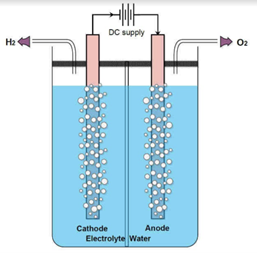
It is one of the energy carriers of the future: hydrogen. But how can hydrogen be produced in a sustainable way? With over 50 million euros in funding from the Netherlands Organisation for Scientific Research(NWO) and industry, a research project involving 58 partners from both the Netherlands and abroad is now underway. Researchers from Leiden University are taking part.
'This hydrogen consortium has been in development since a meeting at the Ministry of Economic Affairs and Climate Policy many years ago,' explains Professor Marc Koper. 'It is wonderful to see it finally take off under the Groenvermogen flag. My group's contribution will be related to electrochemical hydrogen production at higher pressure.'
Degradation makes green hydrogen expensive
'What's unique about this project is that it brings together research on all aspects of green hydrogen production,' says an enthusiastic Rik Mom, a researcher in chemistry. 'In my research, I will be looking at the degradation of various components in electrochemical cells, in collaboration with the manufacturers who produce these components. Cell degradation is a major factor contributing to the high cost of green hydrogren, and it's something we currently don't fully understand. This broad collaboration will allow us to make important progress in this area.'

What is it? Electrolysis
In electrolysis, water (H2O) is converted into hydrogen (H2) gas and oxygen (H2) gas via an electrochemical reaction. To do this, you place two electrodes in water in which salt is dissolved. The salt provides good electrical conductivity. As soon as you apply an electrical voltage to the electrodes, bubbles of hydrogen gas form at one electrode and oxygen bubbles at the other.
Photo credits: International Journal of Engineering and Advanced Technology (IJEAT)
To produce green hydrogen cheaply and on a large scale, it is necessary to improve electrolysis technology. This consortium is taking on that challenge. They will also work on developing a Dutch supply chain for materials, components, and systems.
Professor Thomas Bäck is very excited about the interdisciplinary collaboration and the societal impact of this project. 'With the Natural Computing group at LIACS, we bring our knowledge of data analysis, artificial intelligence, and optimisation for the electrochemical aspects of hydrogen production.'
'I want to contribute to a sustainable future for our world.'
Yingjie Fan is a computer scientist at LIACS. In this project, she and her team will develop and implement AI methods for the development of hydrogen technology. She explains that chemical and physical experiments are often time-consuming and expensive. 'We hope to use AI to accelerate the development of new technology and reduce costs.' Contributing to the green energy transition means a lot to Fan. 'I will also seek to apply for additional green energy-related grants and contribute even further to a sustainable future for our world.'
About the consortium
The consortium HyPRO: Towards flexible, durable, and high-performance Hydrogen Production Technology, was formed during two intensive workshops in which all parties had to jointly arrive at a single proposal. HyPRO is a collaboration of ten universities, five universities of applied sciences (UAS), two research institutes and more than 40 companies. It is also remarkable that companies from the UK, Italy, Denmark, France and Germany are contributing to this consortium.






